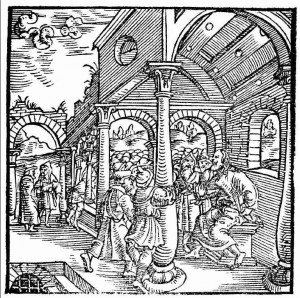Thoughts on Today’s Lessons for Sunday, Jan. 27, 2013.

Jesus in the Synagogue
Jerusalem and the temple are still under reconstruction after the return from exile in Babylon. We hear from the “minor” prophet Nehemiah, who – like the priest and prophet Ezra – is thought to have been sent from Persia to help the Israelites re-settle in Jerusalem. It is fascinating to see echoes of the ancients with our own Sunday liturgy: The people stand, pray, bow, hear the Bible reading and something like a sermon, then joyfully disperse to celebrate their Sabbath.
Psalm 19
First in today’s Psalm, we sing the glory of God. Then we sing the glory of God’s law, which the Psalmist understood as the Torah, the first five books of the Old Testament that set out God’s covenant with the people: the holy scrolls that the scribe Ezra read to the community in the first reading. The heavens and the skies themselves pour out the glory of God and of God’s work in the law.
Second Reading: 1 Corinthians 12:12-31a
Following last Sunday’s declaration that every member has a role in the church, Paul now likens the people of Corinth – and all of us – to the body of the risen Christ in the world. All the parts of the body are necessary. All have to work together. The eye, the hand, the ear, the leg … none can go it alone. What works for our bodies works for our church: We’re all in this together, and we need and respect one another!
Gospel: Luke 4:14-21
Jesus begins his public ministry in the synagogue, reading from the Prophet Isaiah. The verse he chooses makes a powerful statement: He claims as his own the call to bring good news to the poor … proclaim release to the captives … give sight to the blind and freedom to the oppressed. If this sounds familiar, it should! This is the message that Jesus preached, the way that he told his people to bring in God’s kingdom on earth. And it sounds a lot like the Magnificat, the song of joy that his mother, Mary, sang, when she learned of his coming birth. When we act as Jesus’s hands in the body of Christ, this is the work we are called to do.
